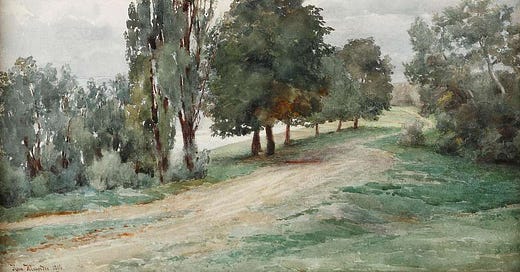On Summer Afternoons
Be prepared to be surprised by this poem about love by one of the leaders of the Harlem Renaissance
Jessie Redmon Fauset, ‘La Vie c’est la Vie’
On summer afternoons I sit Quiescent by you in the park, And idly watch the sunbeams gild And tint the ash-trees' bark. Or else I watch the squirrels frisk And chaffer in the grassy lane; And all the while I mark your voice Breaking with love and pain. I know a woman who would give Her chance of heaven to take my place; To see the love-light in your eyes, The love-glow on your face! And there's a man whose lightest word Can set my chilly blood afire; Fulfilment of his least behest Defines my life's desire. But he will none of me, Nor I Of you. Nor you of her. 'Tis said The world is full of jests like these.— I wish that I were dead.
What we love about this poem…
It takes us completely by surprise. The opening sets up an enchanting atmosphere: summer, the park, sunbeams, frolicking squirrels. Then, the end of the second stanza suddenly shifts the poem’s tone from lovely contentment to heartbreak and, finally, thoughts of death.
The apparently neat rhyme is so clever because of the disruptive run-ons and short sentences in that final stanza. Nothing fits the pattern that's been laid out for it, in the end. The final line sounds oddly conversational as a result, and the rhyme on ‘dead’ hits like an anvil.
About the Author
Jessie Redmon Fauset (1882-1961) was a novelist who also served as literary editor of The Crisis from 1919 to 1927, overseeing its most productive and fertile period and supporting the careers of key writers of the Harlem Renaissance like Claude Mackay, Nella Larsen, Countee Cullen, Georgia Douglas Johnson, and Langston Hughes. After leaving The Crisis she focused on her fiction writing, supplementing her income by teaching French at a high school in the Bronx.
To read alongside…
Our newsletter on Countee Cullen also features a Harlem Renaissance-era love poem with a trick. And Fauset’s editorial work at The Crisis links her to that publication’s founding editor, W.E.B. Du Bois—read our newsletter featuring an excerpt from his short science-fiction story ‘The Comet.’
Fauset also wrote novels, among them Plum Bun (1928), depicting a young light-skinned African American woman who, like the heroine of Nella Larsen’s novel Passing (1929), ‘passes’ for white in a racist society.
Suggest a LitHit!
Tell us your own favourites from literature you've read, and we can feature you as a Guest Curator. Just email us with the following information:
Your full name
The title of the book you're suggesting
The location of the excerpt within the book (e.g., "in the middle of chapter 5"), or the excerpt itself copied into the email or attached to it (in Word)
Why you love it, in just a few sentences
About LitHits
LitHits helps you make time for reading by bringing you unabridged excerpts from brilliant literature that you can read on the go, anytime or any place. Our curators carefully select and frame each excerpt so that you can dive right in. We are more than a book recommendation site: we connect you with a powerful, enduring piece of literature, served directly to your mobile phone, tablet or computer.
You might also enjoy...
Feedback
We'd love to hear your thoughts on our newsletter:
kirsten@lit-hits.co.uk
Graphic design by Sara Azmy
All curation content © 2024 LitHits. All rights reserved.




